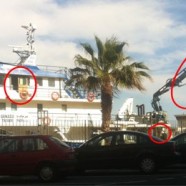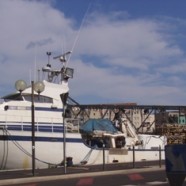Whaling Summit at the Channel Island Jersey
The 63rd annual meeting of the International Whaling Commission (IWC) will take place from July 11th to 14th on the Channel Island Jersey. Robin des Bois would like to take this opportunity to express strong concerns about the deterioration of sanitary state of whales following the tsunami and nuclear accident at Fukushima Daiichi which hit Japan and the North Pacific.
Libya still Manages their Embassy in Sète
Despite the current conflict and the break in diplomatic relations between France and Libya, the city of Sète and its tourist heart continue to represent Libya, as always without problem, the regime of the famous colonel. Ten tuna fishing boats proudly claiming their homeport and their administrative and financial connections with Tripoli adorn the streets and terraces of the cafés. The riverboats in Sète departing the old city’s bridge leave to the right a part of the Libyan fleet while declaiming through a megaphone, “Since forever the tuna fishing boats of Sète fish for bluefin tuna exclusively in the Mediterranean.”
Aprochim: The Countryside Factory
Following the alert at the beginning of 2011 on the passing of the health threshold by PCBs and dioxins in a sample of milk, the investigation broadens to a perimeter of 3 km around Aprochim, placing today under total or partial isolation the livestock of 8 agricultural farms at Grez-en-Bouère and at Bouère in the Mayenne region. The quasi-totality of the investigation concerns the meat and the fat from meat. For the milk, the situation is fluctuating and to this day the commercialization of the production of only one farm is suspended. The chicken factory farms are not touched, but the official report must be consolidated when the chickens are liberated from their cages in the springtime. On the other hand, the diligent research by the Regional Agency of Health shows that eggs in domestic backyards contain PCB and dioxin levels superior to the national average. The geographic logic of the contamination designates Aprochim as principally responsible.
A disaster for dolphins and whales too
Earthquake and Tsunami in Japan
Press release n°11
Several species of large and small cetaceans frequent the coastal waters of eastern Japan and are in the area affected by the liquid and atmospheric radioactive effluent discharged by the Fukushima-Daiichi nuclear power plant.
In particular, this concerns sperm whales, Bryde’s whales, Minke whales, Dall’s porpoises and dolphins. Their lifespan, diet and position at the top of the marine food chain expose them all to the bioaccumulation of chemical and radioactive pollutants.
The radioactive contamination of fish
The French and European authorities don’t appear to have grasped all the difficulties raised by the control of fish and other seafood products likely to have been contaminated by atmospheric deposits and liquid radioactive matter in the coastal and deep sea regions of the North West Pacific. This is the most productive area in the world. It is exploited by fleets from Japan, China, South Korea, Taiwan and Russia. IUU fishing – illegal, non-declared and non-regulated – is very active here.
Global catches are approximately 20 million tonnes per year. Catches of Japanese anchovy and mackerel reach 1.5 million tonnes and 900 thousand tonnes per year respectively. Squid, cuttlefish and octopus catches are in the order of 1 million tonnes per year, and Japanese calamari and scallops are in the order of 1 million tonnes and 200 thousand tonnes per year respectively.
When the cows turn into radioactive waste
As part of the work of CODIR-PA(1) aimed at drawing up a post- nuclear-accident doctrine in France, the case of herds producing milk or meat contaminated beyond the maximum admissible norms was examined. Two ideas were considered:
– 1 Slaughter the herds. The Veterinary Services Department recommends burying the carcasses on the spot in pre-selected locations that do not expose groundwater and surface water to radioactivity migration. The VSD has had some experience of this procedure during outbreaks of disease.
Massive falls of the Robin in the North Sea
Over 50 million migrating birds cross the North Sea twice a year. Birds that use stars for navigation purposes are considerably attracted to the illumination of offshore platforms. Over 7 species are particularly affected by this phenomenon in the North Sea. Impact is at its greatest when the night sky is covered by clouds; it leads to a total disorientation of the birds which circle for hours at night in the ocean around this false constellation which is in fact an offshore platform.
According to the report presented by The Netherlands to other Contracting Parties of the OSPAR Convention, one platform could be responsible for the death of 60,000 birds per year.











